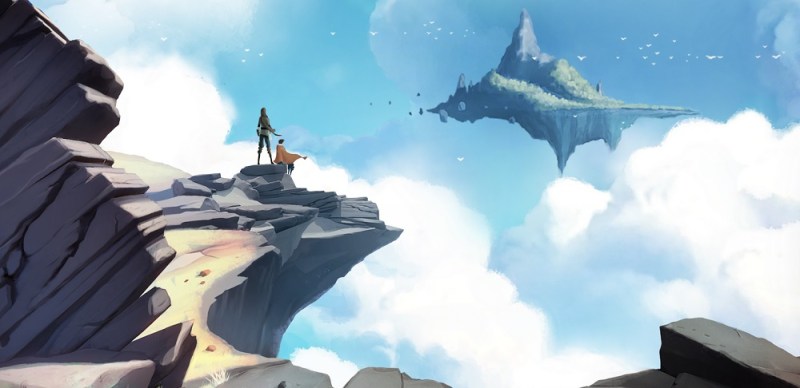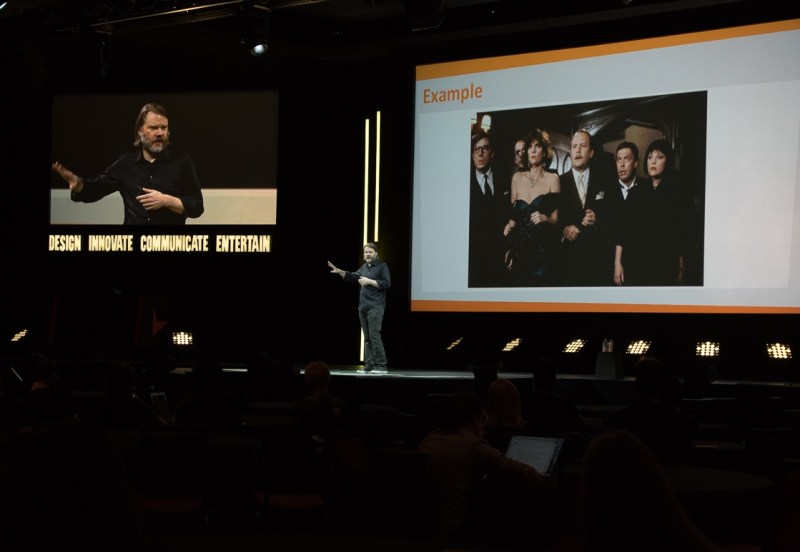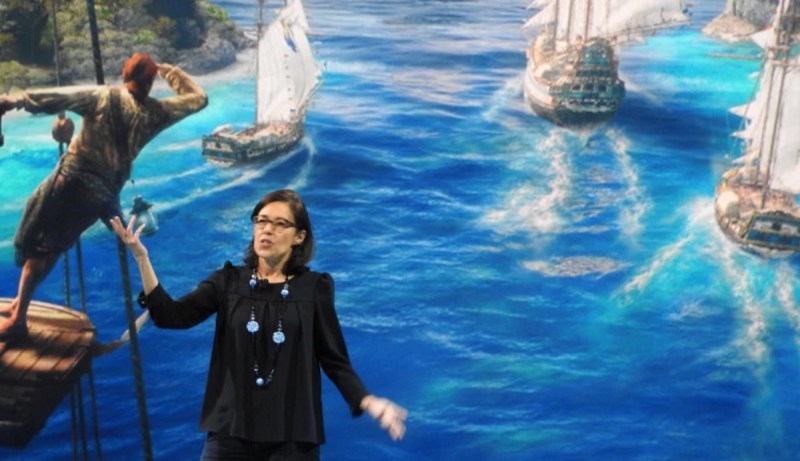Chet Faliszek left Valve last year after 12 years, with the last few spent evangelizing virtual reality via the company’s SteamVR platform. He took six months off and then took a job as creative director at Bossa Studios.
At London-based Bossa, Faliszek believes he can use artificial intelligence not only to add to a game, but to fundamentally change the way of telling stories and narratives in games. (This kind of topic that merges tech and games is what we’ll talk about at our GamesBeat Summit coming up April 9-10 in Berkeley, California.)
He is using this approach in a new action game with cooperative multiplayer play. His work is early still, and so he isn’t ready to start talking about the kind of game he is building. But he gave a talk at the DICE Summit, the elite gaming event in Las Vegas last week, and I interviewed him about it.
“One way to think about it is, there’s the world, and it’s a living world. The AIs in the world are doing their thing, regardless of you,” said Faliszek. “When you go into that world and do your thing and interact with them, some of those interactions will cause the opportunity for story to exist. There are really simple ones. I use the example of, you can steal a faction’s supplies. An hour later, when you see that faction coming over the hill to attack you, you know what’s going on.”
Here’s an edited transcript of our interview.

Above: Chet Faliszek of Bossa Studios.
GamesBeat: How was your decompression after Valve?
Chet Faliszek: It was nice. I shipped a lot of games, shipped hardware, and did a lot of things at Valve. But yeah, I had never taken that much time off. Taking six months off was fun. I went from 300 to 500 emails a day to 10.
GamesBeat: How did you view your time there? Did you feel like it was time to move on for any reason?
Faliszek: I learned so much and grew so much at Valve. Absolutely nothing negative or bad. It was just, after 12 years, some things happen where you want to make some changes in your life, and that was one of them. I still, not too long ago, just suggested that someone go to work at Valve and introduced them. There’s no animosity with those guys. They’re doing cool stuff.
GamesBeat: Do you strongly remember any accomplishments related to SteamVR?
Faliszek: Definitely, that was fun. I’d never gotten to do something like that before. Valve is a great place where, if you want to go off and apply yourself, you get to do some weird, crazy, fun things. That Wednesday morning of GDC where it was first announced was one of the best moments, as good as any game launch. Just seeing all the reaction, all the coverage and surprise, seeing the devs I’d worked with to that point come out and people loving the stuff they were playing. It was great.
GamesBeat: It was a very small team, right?
Faliszek: Valve tends to have smaller teams than you would think doing a lot of stuff. It’s kind of amazing that way.

Above: HTC has already made the hardware, and now it’s making software as well.
GamesBeat: How did you think about where to wind up?
Faliszek: I knew the Bossa guys for a long time. We’ve always been friends. I was having thoughts of changing up and mixing up what I was doing. I was looking and talking with everyone. One of the great things about the last three years is I got to visit every studio, big or small, and see how they worked. It was a lot of experience. The Bossa guys really jelled with me and the risks I wanted to take. I wanted to do something different and strange, but understandable.
One of my goals was to get different perspectives in life and work with a company outside the U.S. I don’t speak a foreign language, so England is a pretty good place to go.
GamesBeat: What’s the message you wanted to get across in your talk?
Faliszek: With this group of people in particular, I wanted to lay out what we’re trying to do with — we say “story and AI,” but it’s a different kind of story. Games aren’t movies or book. They’re their own thing. So what kind of story can you tell, giving the player agency? How do you approach that? In front of this group, I wanted to raise the challenges we have in trying to do that. Seeing if there are other people struggling with this, other wanting to talk about it, other people who have solutions for us.
One of the things that impressed me so much about all the VR stuff was, you could introduce two VR devs to each other, and they would never act as if they were in competition. They’d always try to work together. They knew they were going through a problem together, something new, and they were very sharing and open about what they were doing.
As we approach this, I’m not pretending we’re the only people doing what we’re doing. It’s weird to call this new, because other people are trying this. There are various versions of what we’re trying to do. It’s good to talk to those people and get that out. I want to let people know what we’re doing, what we’re trying to achieve. Are we wrong? Is there a better way to achieve this? There are already prototypes of stuff we’ve done. We’ve learned some things. We’re improving stuff every day. But still, there are unanswered questions.

Above: Bossa Studios’ Worlds Adrift
GamesBeat: How would you describe this kind of AI storytelling?
Faliszek: I want to make a good game. I want to make a game that embraces what I think is special about narrative in games. That’s not just the interactivity, but also the agency. The best way to express that that I can find is to use AI to help us expand out how we do that. I’ve no interest in proving AI theory. I’ve no interest in proving AI in any way. I have an interest in making a good game. It just happens to be a tool to do that in our eyes, so we’re using it for that function.
GamesBeat: How does it help?
Faliszek: In traditional stories you have to — if you’re making side missions or quests or something, ignoring art and animation for a minute and just talking about player progression, you normally get a writer and a designer together. You plan out the route for the player. You then write the lines, record the lines. You cut some lines. You hook them up in the game. You start testing them. You’re kind of locked in early on, because there’s all this other stuff being built around that idea.
I once wrote the line, “Go pick up that thing over there.” Because in the process of when we needed to write those lines, it was so early, but yet late, we knew we wanted you to pick something up, but we didn’t know what it was or where it was. It trapped you. That kind of making a game is making this linear set of content flow. We want to make systems of content so we aren’t writing every single line. We aren’t crafting every experience. Instead, the player’s interactions are generating those.
GamesBeat: Emergent storytelling, in a way?
Faliszek: Emergent storytelling is already kind of defined, and it’s not quite that. I’m hesitant to use loaded words that have baggage already. Not negative baggage, but just meaning that people already assume. I tend to use the word “story.” Then people over-index into that. They think we’re making a TWINE game, or even a traditional, “Here’s action, and then story, and then some more action.” We’re saying that you need to meld those two together. The story and the action need to be the same. That’s how you tell the story. Those are linked. Then you have to give the player agency inside of that to do the things they want to do.
GamesBeat: And so your side quest is generated automatically?
Faliszek: One way to think about it is, there’s the world, and it’s a living world. The AIs in the world are doing their thing, regardless of you. When you go into that world and do your thing and interact with them, some of those interactions will cause the opportunity for story to exist. There are really simple ones. I use the example of, you can steal a faction’s supplies. An hour later, when you see that faction coming over the hill to attack you, you know what’s going on. You know you’re fighting those guys. There’s no NPC needed to say, “In this mission you’re going to have to defend your base.” You just know that’s what you have to do.
But then we can get a little more complex if we start expanding the number of verbs we use. Let’s say you want to have something like — there’s an NPC that says, “Hey, I want to build a gun.” Every day you hand them a part for their gun and they give you some money. Now you have a relationship with them. You understand this relationship. You’re not best friends, but it’s mutually beneficial. At the end of that, they assemble their gun and start shooting at you. All of a sudden, that’s not a random NPC shooting at you. That’s someone who betrayed you. Your reaction to that and your interaction in that combat is different. It’s a heightened emotion.
Some of it is trying to do that in a more complicated way, by having a bigger set of verbs. The other way to attack it is by having large problems for players to solve. You don’t establish a relationship if you just walk into a room and a guy shoots you or you shoot him. You establish a relationship by having an ongoing interaction with an NPC. That’s why we try to make big problems for players to solve, so they have a longer engagement. Then we can do things like betrayal. If you’ve helped somebody for a week of game time and then they turn on you and you understand why they’re turning on you, right? It’s not some random thing. You understand it. But you’re still going to be angry. You’ll buy in through that.

GamesBeat: What is the scope of the project like? Has there been a team assembled?
Faliszek: We’ve been building a team in London. That’ll continue to grow through the year. We’re not announcing dates or anything yet. I’m still in Seattle, though. There are risks to that, for sure. But in another way it’s also helpful. Our development process is about empowering the team and empowering the individuals on the team. One of the ways it keeps me honest is, they have to be empowered. I can’t be there. They’re smart. They know what to do. It’s giving them freedom.
If you join our team, I send you a little email that explains how we’re working. “You have a lot of autonomy. You’re making the game. I’m not the head designer. We’re all doing this together. I’m just the guy who keeps it all together.”
GamesBeat: Does this have to do with anything related to Improbable? They’re enabling big worlds, you’re populating big worlds with stories.
Faliszek: No. With Bossa they’re doing Worlds Adrift, which is using that. I love Herman and the guys, but for this game it’s about four-player co-op. There’s not a lot of players. It’s about having agency and impact on your world. If you expand that with too many people in the world, you don’t know why the world is changing. We want to make sure that you do know, so we make it smaller in that way.
GamesBeat: Conceivably you could take this thinking to other kinds of games, though?
Faliszek: Correct. The idea we’re trying to work on, we’re being open and sharing about it, so it may be applicable or usable in a broader sense. We’ll see. Before we get to any of that we have to concentrate on making a good game. That’s the number one focus. After that, there’s a lot of opportunity.
GamesBeat: With AI, was there something about it that convinced you that now is the time?
Faliszek: A lot of the stuff I did in VR was helpful. I got to see a lot of interesting things. I got to see an emerging tech as it was emerging, knowing that back at Valve we had a room with a really high-end version of this tech. Out in the world people were thinking of where they are in that. Knowing that they either didn’t understand their problems or did understand them and seeing how that evolved was really interesting to me.
I started looking at AI and seeing a bunch of broken tools, but some of these were broken in a way where I understood where they were going to go. I understood how they were going to be able to pull this together. And then seeing some of the other advances that are happening — you have to be honest about where it is. In conversational or narrative AI, it’s not at alpha build level. It’s not at some of the crazy stuff you see out of Deep Mind. When people think about AI they often think of something like Alexa and Siri. That’s not actually AI. That’s people in the back room entering a bunch of data and then really good search tools for the input of your speech.
We’re not there on those tools. But I can see them coalescing. I can see, hopefully, that if we have this pressure on it, to want to go do this, and come to shows like this and express what we’re trying to do, and have people come up and say, “Oh, we tried to do that too, here’s where we ran into problems, we should talk about this more,” we can get enough people together to decide this is a problem to attack and go after.

Above: Chet Faliszek hopes players will form long-term relations with non-player characters.
GamesBeat: What is relevant in terms of learning and neural networks, as opposed to that kind of pre-programmed solution? Do you feel that the learning side of it matters for what you’re trying to do?
Faliszek: We think it’s one part of the system. There are multiple layers to the system and we think that’s one part of it, because one part of it needs to keep looking at what’s happening. We want to avoid—any time you give players something, they’re smart. They learn to min-max super quick and hard. If it’s adjusting to them and challenging them, they’ll ruin their own fun to maximize what they get out. And so part of it needs to make sure we’re addressing that. That’s one way to do it.
GamesBeat: I believe there’s a storyteller here that’s really smart, giving me these things to do, but at some point, if I no longer believe it, it’s game over.
Faliszek: Well, hopefully you have no idea there’s AI. You don’t care about that. You’re just in the world having these experiences, having these challenges that are personal to you. These aren’t stories that are big and pre-written. But we want it to feel like your story in that you’re achieving things. You’re changing the world you’re playing. You’re having these experiences and these stories you can tell your friends about.
Some of this comes from when we were working on Left 4 Dead. We wanted to give people the place that — the game lets you breathe when it comes to stories. It’s not, “Hey, I rescued Zoe.” It’s, “Hey, I rescued Dean.” How do you tell those stories? How do you have those experiences?
GamesBeat: Are there some other key inspirations here?
Faliszek: One of the underlying things is just multiplayer games in general, where you have this emergent narrative happening. In my talk I use the example of PUBG. I have a slide where I got a chicken dinner, and I didn’t kill anybody. “The Pacifist Achievement.” I have this story I could tell you about how this happened, this really strange thing. But you have a limited set of verbs there, because that game has a limited set of verbs. Not saying the game’s bad, because what they go after they nail. But you have all these places you can tell those stories there. What if we took that and, using NPCs and expanding the verb set, told stories that are like that, but richer and more complex?
GamesBeat: How does that pacifist thing work?
Faliszek: The final circle encompassed one of the big apartment buildings. There were 12 or 13 people. I was the only one outside. Everyone else was inside. These giant gunfights broke out in the final 90 seconds, and as the circle moved to the courtyard out front, I was out front. I saw the guy running down, but he got injured and died before he got to me. [laughs]
I love that game because I can try to play it in strange ways. I once tried to get into the final 10 with — I think I had eight gas cans and nothing else. I was naked, backpack, and gas cans. I wanted some guy to find my body and say, “What strategy is he using here? He got in the final 10. He most have been doing something right. What was he doing with the gas cans?” Just bewilder that poor guy who’s left with that knowledge.

Above: Chet Faliszek at the DICE Summit in Las Vegas.
GamesBeat: What else are you thinking about as far as things like genre, or when you want to finish this?
Faliszek: We’re not talking about dates yet. It’s an action game, but it’s not the frenetic action of a Left 4 Dead. It’s more strategic in its pacing. That’s one thing about agency. You have to allow people to not just react, but choose how to act and how to approach things.
Right now we’re building it in a very iterative way. We know what we’re shooting for, what we’re trying to get, but there’s not a big design document to get there. We’re taking steps. We put in pieces, test them, see what works, and keep iterating our way there. As people may know about Valve, that doesn’t help with timelines and schedules, but hopefully it does lead to a quality game at the end.
GamesBeat: Lidwine Sauer, the Ubisoft researcher, had an interesting bird’s-eye view of games in her talk. She talked about how all these simultaneous revolutions are happening, and you have to believe they’re going to affect games somehow. We don’t know exactly what will happen, but if you only looked at games, you could miss these things that are happening that could help you. Moore’s Law is advancing. AI, blockchain, all these things have to cause innovations in games somehow. If you don’t pay attention to these things around the edge of the industry, you’re going to miss out. That seems like one of the things you’ve done.
Faliszek: She and I talked a little bit this morning. It’s definitely about looking and saying, “This isn’t ready today, but let’s make a bet.” When I originally went to Henrique Olifiers and Imre Jele I said, “I want to do something that could fail.” Something where we’ll close our eyes on some parts of it and believe it will come together. That’s one of the interesting parts of this. They were willing to take that risk.
I agree with her on that, though. There’s so much going on. The great thing is, the writer in me — I listen to podcasts about a lot of technology and AI stuff, a lot of stuff that’s over my head. But every so often they have these little stories that make me think, “Oh my God, that’s it. That’s the thing. That’s not the application we’re thinking about, but that’s totally what we want to go and do.”
The good thing is, for the most part a lot of the AI stuff now — I’ve reached out and talked with some people. We have researchers on our team. People are being pretty open, pretty sharing about it. It’s been interesting.

Above: Lidwine Sauer at the Dice Summit.
GamesBeat: It sounds like you can do something original if you start going down these paths of where technology is going to be.
Faliszek: I’m always hesitant to say “original” or “new,” because someone will rightly point out that this game in 1987 did whatever it is. “Okay, they were on to something.”
The real thing that I think we’re chasing, though — in my head, movies have a way they tell story. They’re good at passage of time. You go from weakling to tough guy in 30 seconds of the film, but it’s two years of life. In books you have an omniscient character. It knows everything. In plays you have a magic moment. In musicals you have this blending of everything coming together where the emotions come out.
In games, I’ve often looked at it and thought that the multiplayer side is what makes them special. It’s that community thing. No other form of entertainment has it in that same way. But there’s also this interaction and agency part. We’ve always been limited in the ways we can do that. Other people have tried things like this, but you can see the wall they hit when you have to hand-craft everything. Trying to free us from that and go after that, that’s what we’re going after. That, in a way, may be the real story feel of games.
You see it in snippets now. You see it in the freedom some games give you in how you approach things. Far Cry, when you’re going after those bases and choosing what to do and how to approach it, as a player those are some of my favorite experiences.

Above: AI
GamesBeat: Is there some sort of wrong interpretation people could have about this? That you’re trying to show AI will write a better game story than a human could?
Faliszek: There’s some of that. I mentioned that in my talk. There’s the joke about how AI could write Emily Dickinson. No, it can’t. The example I use is that if you gave AI a bottle of booze, it couldn’t write the collected works of Charles Bukowski. It wouldn’t have the inspiration. But if you gave it all those works, it could ape them.
In some game writing — I use the example of how, in Left 4 Dead, we always wanted the characters talking. When they weren’t talking, you would wonder, “What happened? Did I miss something, what’s going on?” In Left 4 Dead they say “Reloading” all the time. That works because you see and hear the right voice, so it’s fine, and it kind of washes over you. We made a rule where we didn’t want clever lines when it came to combat barks, because they would stick out. Even if you ran 10 of them, if one of them was clever, every time the clever one came around you’d be like, “Awwwwww.”
So when you don’t have to be clever, when you’re just writing informational stuff, maybe AI can do that part of it? Then we start expanding out how we think about it. We think about what narrative can be. Narrative, in this case, isn’t TWINE stories. It isn’t cutscenes. It’s information. It’s player intent being understood. It’s going back to what I said about how if you steal that faction’s supplies and they attack you, you don’t need a guy to stand up and tell you why. You understand the intent already.
A lot of storytelling in games is that intent. It’s either intent, trying to express intent, or it’s exposition, because you are not your character. If your character knows more than you, a lot of exposition has to catch you up to what your character knows. We’re trying to remove that. You know as much as your character does.
To settle the other common confusions about this project, on a meta level, is it’s not VR, and it’s not using Improbable. Those are both fine. I played a bunch of VR stuff again the other day. Because we want people to chew on the narrative side of this, we need to make some other things familiar. You can’t make the player learn everything all at once. That’s too much. I don’t want to play that, let alone make someone else play that. We need to give them familiar footing, and then the new thing they’re learning is layered on top of what we’re doing.
I don’t think we could do what we’re doing 10 years ago. I don’t think the players — there are things we can do with players now because they’re smarter, in the sense of being more sophisticated. They’ve played so many of these kinds of games that they get it now. Inside is an example of this. That whole beginning part in particular, that only works because we’ve all played so many platformers. We know the language they’re speaking to us. We don’t need to be trained. As games become more mature, as more people play them, as they become more mainstream—you can do different things as a designer now because you can assume that your audience has this richer understanding of the language to interact with what you’re doing.

